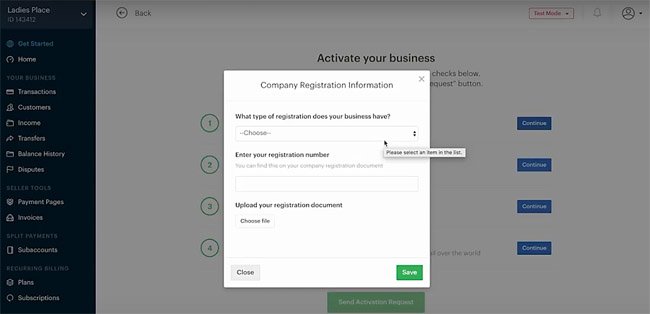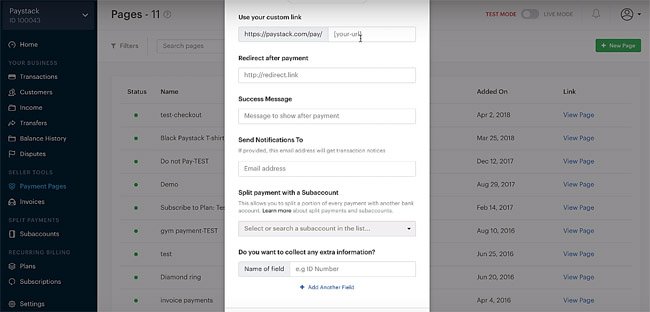Table of Contents
What is Paystack?
Paystack is an online payment gateway Owned by Ezra Olubi and Shola Akinlade. And built to facilitate ecommerce in Nigeria, it is a platform for financial transactions between the merchants and customers.. Paystack supports payments made by customers from anywhere in the world.
Is Paystack Reliable?
Paystack is a PCI-certified, auditor certified, PCI Service Provider Level 1 – the highest certification level. All connections to the services are forced to happen over HTTPS using TLS 1.2 (SSL).
Paystack uses HSTS to ensure browsers interact with Paystack only over HTTPS.
also read Piggyvest review: Invest And Save Money On Piggyvest
Card Information
Card details are encrypted using AES-256 GCM while the decryption keys are stored on a separate machine. As such, cards are not stored as plain numbers but securely hidden even from Paystack personnel and systems. The only actions our systems can take is to request that card details be sent to a service provider.
Fraud Prevention
Paystack has developed an internal decision support system that uses intelligent rules to determine the risk factor of a transaction or customer and blocking payment from being made if it does not pass the necessary checks. This decision is based on a combination of multiple factors such as geolocation, IP addresses, purchase and behaviour history, and so on.
Merchants on the paystack platform have also been equipped with a dashboard that allows them to blacklist customers that have been fraudulent, which further helps the general system to learn and prevent such behaviour. the paystack Fraud & Dispute Team is constantly at work developing processes for identifying fraud patterns to improve our Fraud Prevention system.
Features Of Paystack
Setting Up
The good news is- pretty much anyone can set up a Paystack account.
But, here’s the deal- only businesses that submit an activation request and are subsequently approved will be able to receive online payments.
Paystack is flexible enough to accommodate multiple setups. What you choose to proceed with depends on your overall business structure, the type of payments you’re seeking to process, your technical coding expertise, and the functionalities you’re targeting.
If coding is not your type of thing, you could settle for Payment Pages, Paystack Invoices, or some of its selected plugins like WordPress.
Now, Paystack Invoices is as simple as that. It essentially grants you the ability to launch invoices, and send them to your customers. The recipient then goes ahead to submit payment without necessarily registering on Paystack.
Paystack Payment Pages operates quite similarly, with only a few differences. While Invoices deals with simple payment requests, Paystack Pages is basically a straightforward URL form sent to buyers. They then proceed to remit payment through the form.
The best thing about these setups is that you don’t even need a website to conduct business. So, of course, Paystack Invoices and Paystack Payment Pages are seemingly suitable for freelancers and micro-businesses.
Sounds good. But, what would be your options if you had a fully operational ecommerce site?
Well, it turns out that Paystack offers a wide range of plugins that can be integrated with popular ecommerce platforms like Magento, Shopify, and WordPress, among others. We’ll be looking into that in detail shortly.
That said, Paystack also grants you some freedom through its API and SDK libraries.
Now, this is where you bring out your biggest coding guns, since only developers would be able to comprehensively customize the platform to embed it into your online store.
Payment Processing
After setting up your Paystack platform, the one thing you’ll probably be worried about is payment processing.
Now, from the customer’s end, your buyers will be able to make payments through mobile money, Visa QR, GTB 737, credit and debit cards, plus their bank accounts. And that’s not all. In future, Paystack plans to roll out additional channels like POS, and mCash.
Some of the supported banks include- Zenith Bank, Wema Bank, GTB, Diamond Bank, Fidelity Bank, and FCMB.
And yes, you’re right. That these are basically local Nigerian banks. It begs the question- does Paystack accommodate international payments?
Fortunately, Paystack has extended beyond Nigeria’s borders. You can accept card payments from anywhere in the world.
But, unfortunately, this provision is not available by default. To facilitate international payments, you have to submit a special request to Paystack, along with your business registration credentials. This is only a security measure to safeguard the entire platform from fraudulent payments.
If everything goes well, you might start accepting international payments in just 24 hours.
Then you’ll notice one particularly interesting aspect here. It turns out that although Paystack accepts international currencies like dollars, the funds are ultimately remitted to your account in Naira. And the corresponding currency exchange rates are determined by your bank.
And speaking of banks, how do you get your earnings to your local account?
Well, there are two ways to process payouts. If you choose the manual option, you can wire funds instantly to your bank account.
Otherwise, you can settle for the popular Next-Day Automatic Payout option. Once the funds hit NGN 50 above the standard payout charges, they are remitted to your bank account 24 hours after the transactions.
However, this only applies to the official working days. Settlements during weekends and public holidays are completed on the subsequent working day.
also read KudaBank Review: All You Need to Know About Kuda Bank (2023)
Security
When it comes to security, Paystack has implemented an array of features to protect card information, prevent transactional fraud, control account privileges, and avoid account hacking.
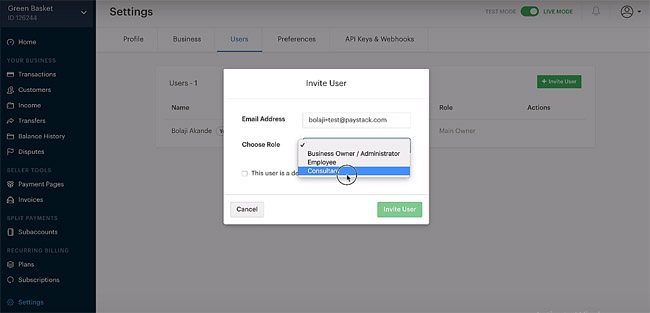
Basically, Paystack is a PCI Service Provider Level 3 payment gateway with auditor and PCI certifications. All the navigations in and around the platform are well-secured over HTTPS via TLS 1.2. And to ensure that this applies to all browsers, the platform uses HSTS.
That said, customers will be pleased that their card information is further protected through AES-256 GCM encryption.
And guess what? The corresponding decryption keys are not held within the main servers. They are stored in separate machines. That means that even Paystack’s employees are blocked off from the card details.
Well, that’s neat. But sadly, it’s just a solution to one part of the whole problem. There’s still another substantially imminent security risk- online payment fraud.
Now, let’s face it. Nigeria is not exactly a darling when it comes to cybercrime rates. It was already at crisis level as early as 2013, when it was discovered that the country’s banks had lost NGN 159 billion to electronic fraud in just three years.
To make matters worse, that only covers one country- which essentially compounds the problem when we shift to other fraud hotspots in the world.
So, to prevent such occurrences, Paystack employs an AI-powered fraud prevention system with multiple security functions.
For starters, it scans each transaction, critically engaging special criteria to assess the corresponding risk levels. Some of the factors analyzed include previous customer behaviors, purchase history, IP address, and geo-location. The riskiest cases are then flagged and blocked- consequently protecting both cardholders and the businesses.
To top it off, a single fraud attempt is blocked off from accessing all businesses on the Paystack platform.
Insights and Reporting
Although the bulk of the dominant ecommerce platforms and their corresponding integrations provide customer insights, it’s always advisable to supplement them with reports right from the horse’s mouth.
Now, is there a better way to achieve that than relying on the precise platform where customers remit their money?
Consequently, it makes sense that Paystack employs numerous analytical tools here.
By tracking your customers’ respective purchases, for instance, Paystack helps you identify the top buyers based on cumulative amounts spent and the number of purchases.
The system then delves deeper to generate info about new and repeat buyers, within any selected time period.
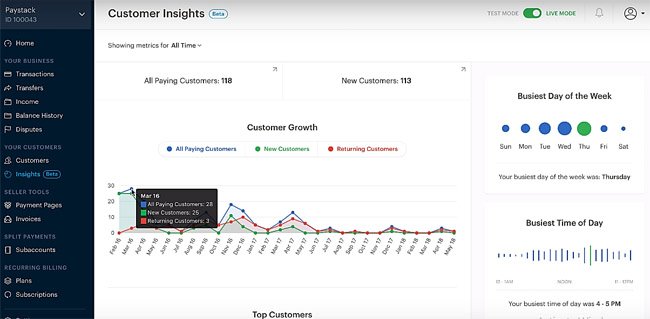
And speaking of time periods, you’ll also be able to establish your busiest peak times and the contrasting off-peak times based on the corresponding purchase patterns.
And you know what? You can export the subsequent reports to third-party platforms for additional analysis. Apart from automated daily and weekly email reports, the system supports downloading of the entire data ecosystem, plus integration of payment info into accounting tools.
also read Cash App Review: Transfer, Receive & Invest money on Cash App
Integrations
As we’ve already mentioned, Paystack attempts to extend its footprint on the ecommerce ecosystem through its numerous integrations. This fundamentally allows businesses built on different underlying architectures to leverage the solution.
Other than that, online stores are able to improve their payment processing functionalities holistically- on multiple platforms.
For WordPress sites, for instance, Paystack provides plugins for
- Premiumpress
- Enginethemes
- Paid Membership Pro
- Sprout Invoices
- WP Jobster
- Payment Forms
- WooCommerce
You can also embed Paystack if your store runs on:
- Prestashop
- Drupal
- Abantecart
- Shopify
- Opencart
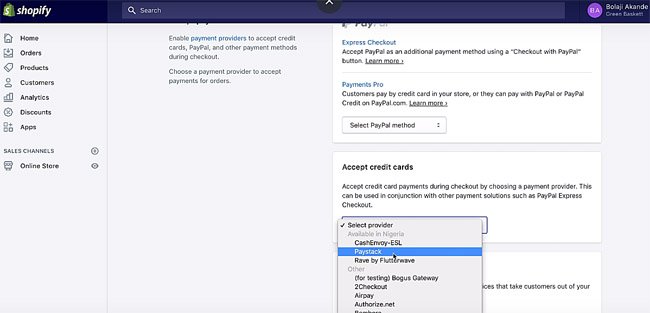
Paystack Go
Managing and tracking payments on PC is relatively easy. But, it’s highly unlikely that you’ll always be able to access a workstation everywhere.
However, thanks to Paystack Go, you can take care of business on the go.
Quite simply, Paystack Go is a mobile version of the Paystack dashboard, which allows you to monitor your payments from anywhere, at any time.
In addition to sending invoices, you can look up all the transaction details, and follow up on your store’s performance metrics- straight from your mobile phone.
And guess what? You don’t even need an internet connection to view the metrics. It turns out that you can also access them offline.
Paystack Review: Pricing
To begin with, setting up a Paystack account is completely free of charge. You only pay for the service when the money starts coming in.
And the amount charged depends on your customer’s location.
For local transactions, Paystack will charge you 1.5% of the transaction amount, plus a flat rate of NGN 100.
Fortunately, transactions that don’t add up to NGN 2,500 are exempted from the flat rate. Additionally, Paystack does not take anything higher than NGN 2,000 as fees, even for transactions worth millions of Naira.
Sadly, you’ll pay more if you intend to sell internationally. The platform levies 3.9% on international transactions, plus a flat rate of NGN 100.
However, just like the local transactions, the NGN 100 flat rate is not charged on transactions lower than NGN 2,500.
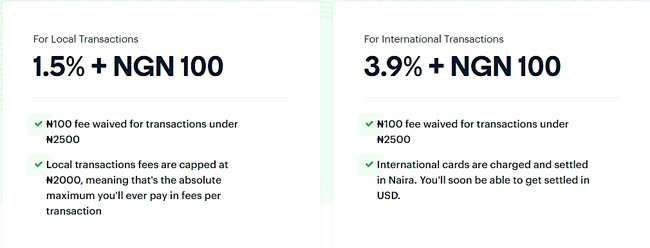
Well, all things considered, this system of pricing has one significant advantage. You could easily offset the fees by charging your customers accordingly.
But, here’s the kicker- Paystack does not support automatic offsetting. That means you only have one option- adding the applicable fees to the individual product prices. Quite a cumbersome affair, but well worth the effort if you need to save money.
also read Paypal review: How to create a paypal account, Sending and Receiving Money Through Paypal
Downside of Paystack
After so many research about paystack, their services seem cool except the customer-support, from the user behaviours and feedback i got from members, Paystack has lack of communication, this is a downside, Now imagine if your funds are on hold/freeze a transaction without any email or phone call notification to the merchant, hence you will have to contact the paystack support before you get a response from them.
Solution: they should employ more support department for communication and improve in their Notification especially when it comes to funds freezing.
Conclusion On Paystack
Paystack is obviously the best for business owners registered in Nigeria. and this could be any kind of business not necessarily an online business.
However, we should also understand that they are still a startup company that’s still in undergoing major growth.


